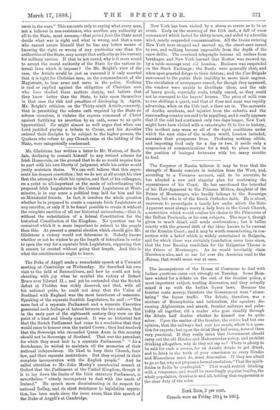Mr. Bright has rather overshot the mark in an attack
of his on the Thirty-seventh Article for saying,—"It is lawful for Christian men, at the commandment of the Magistrate, to wear weapons and nerve in the wars." This amounts only to saying what every man, not a believer in non-resistance, who ascribes any authority at all to the State, must assume,—that prirmi facie the State must -decide what war is right and what is wrong, and that a man who cannot assure himself that he has any better means of knowing the right or wrong of any particular war than the authorities of the State, may accept that authority as his warrant for military service. If that be not sound, why is it more sound to accept the moral authority of the State for the various in- ternal laws which it imposes ? On Mr. Bright's view of the case, the Article would be just as unsound if it only asserted that it is right for Christian men, on the commandment of the Magistrate, to bear arms and serve in the police. Nothing is said or implied against the obligation of Christian men who hare studied these matters deeply, and believe that they know better than the State, to take upon themselves in that case the risk and penalties of disobeying it. Again, Mr. Bright's criticism on the Thirty-ninth Article,—namely, that in permitting the solemn oath required by the State on solemn occasions, it violates the express command of Christ against fortifying an assertion by an oath, seems to us quite hypercritical. He might almost as well argue that when our Lord justified paying a tribute to Ceesar, and his Apostles ordered their disciples to be subject to the higher powers, the Quakers who refuse to pay Church-rates at the bidding of the State, were categorically condemned.



































 Previous page
Previous page